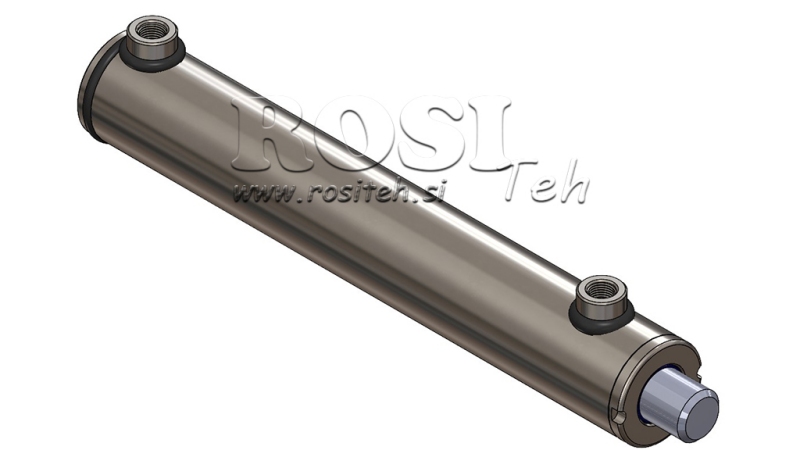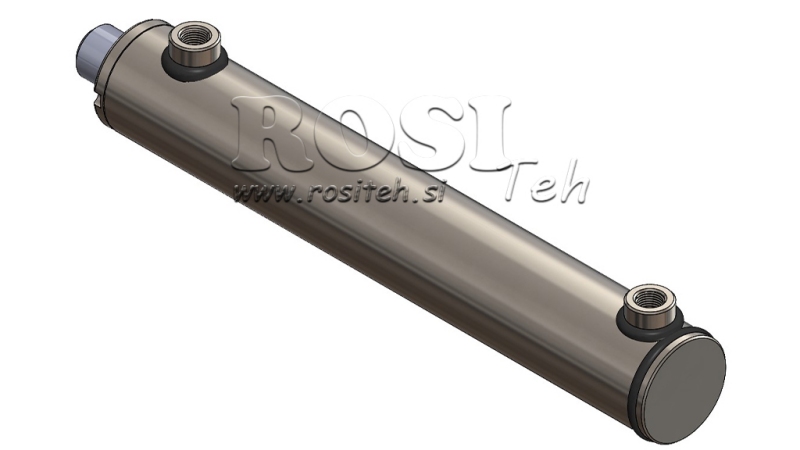HYDRAULIC CYLINDER STANDARD 100/50-200
DIMENSIONS

| STANDARD | E | D (stroke) |
| [mm] | ||
| 100/50-100 | 286 | 100 |
| 100/50-150 | 336 | 150 |
| 100/50-200 | 386 | 200 |
| 100/50-250 | 436 | 250 |
| 100/50-300 | 486 | 300 |
| 100/50-350 | 536 | 350 |
| 100/50-400 | 586 | 400 |
| 100/50-450 | 636 | 450 |
| 100/50-500 | 686 | 500 |
| 100/50-550 | 736 | 550 |
| 100/50-600 | 786 | 600 |
| 100/50-700 | 886 | 700 |
| 100/50-800 | 986 | 800 |
| 100/50-900 | 1086 | 900 |
| 100/50-1000 | 1186 | 1000 |
| 100/50-1100 | 1286 | 1100 |
| 100/50-1200 | 1386 | 1200 |
| 100/50-1300 | 1486 | 1300 |
| 100/50-1400 | 1586 | 1400 |
| 100/50-1500 | 1686 | 1500 |
HYDRAULIC CYLINDERS
Hydraulic cylinders convert hydraulic energy into linear force and consequently movement. They operate based on Pascal's law and utilize the force generated by the pressure of the enclosed liquid - oil. When hydraulic fluid is pumped to one side of the cylinder, it pushes the piston, creating linear movement in the desired direction.
A typical double-acting hydraulic cylinder ('differential cylinder') has two connections (for hydraulic hoses), allowing linear movement in both directions.
 |  |
Due to the different ratio of the area of the pressed oil on one side or the other of the cylinder, the cylinder also has different power when extending or retracting. Consequently, due to the different volume of oil on one or the other side of the cylinder, the speed of the cylinder (piston) is also different (faster or slower). During 'extension' of the cylinder, the oil acts on the entire surface of the piston, causing the cylinder to exert greater force and move more slowly; conversely, during 'retraction', where the area is smaller by the diameter of the rod, the cylinder overcomes less force, allowing it to move faster.
Applications of hydraulic cylinders:
Hydraulic cylinders are useful wherever there is a need for greater power. In agriculture, hydraulic cylinders are used for tractors (lifting arms of three-point linkages, top links, hydraulic steering, loaders, front linkages, etc.), combines, loaders, etc. They are equally widely used on various tractor attachments, such as rakes, loaders, tipper trailers, wood splitters, hatches on slurry tanks, harrows, moving mowers and mulchers, forage harvesters, turning plows for soil, snow plows, forestry winches, etc.
Hydraulic cylinders are also very commonly used in forestry, machine building, construction, shipbuilding, energy, food industry, and automotive industry.

We know several types of hydraulic cylinders (different mountings):
Hydraulic cylinders are available in various dimensions and with various mountings to meet different needs.
 | Hydraulic cylinders 'STANDARD' |  |
 | Hydraulic cylinders 'HOLE' |  |
 | Hydraulic cylinders 'POINT' |  |
 | Hydraulic cylinders 'FORK' |  |
 | Hydraulic cylinders 'FLANGE' |  |


















